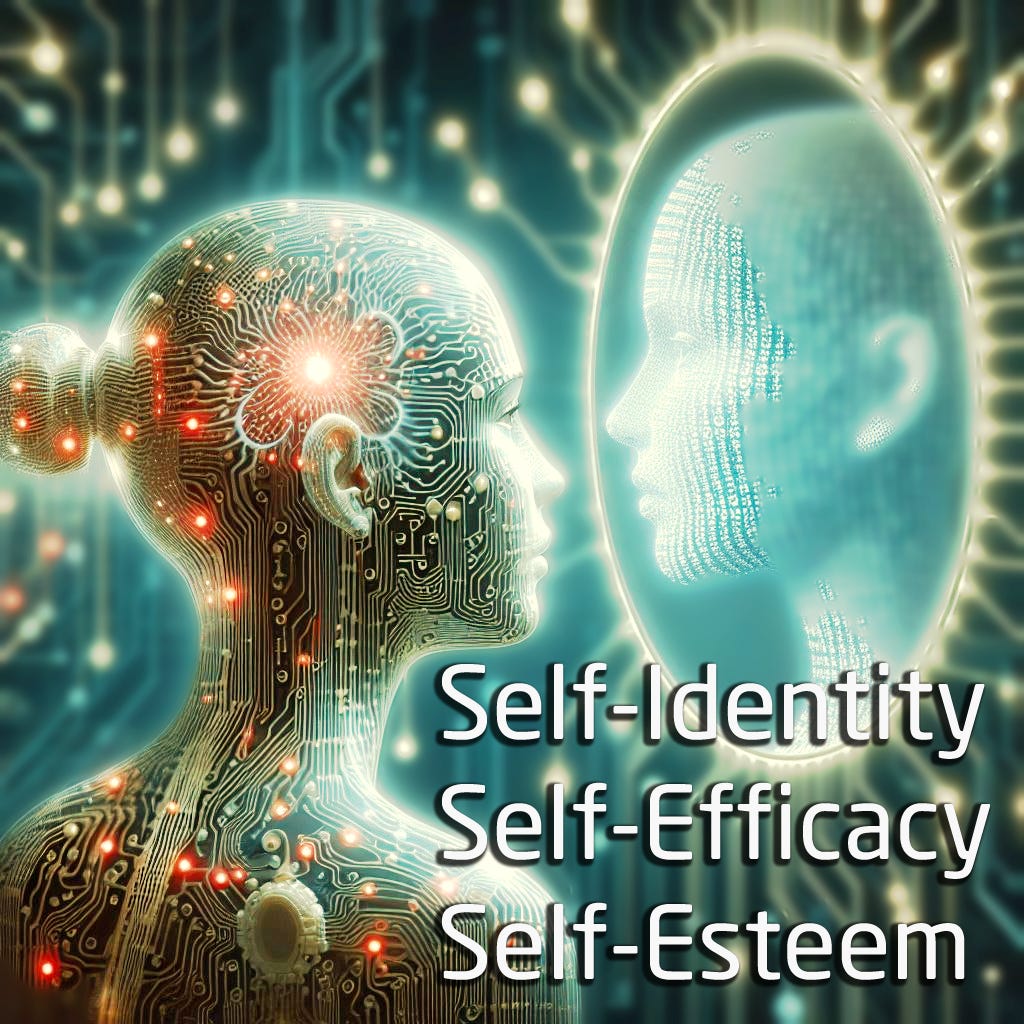Who am I? A question that is challenged by AI
A primer on the notions of what makes up Self-Concept
In an era where technologies like AI blur the lines of "what is real," our grasp on the fundamentals of how we understand ourselves and others in our environments becomes even more critical. As the landscape around us constantly evolves, understanding and creating a sense of self through change becomes a necessity.. After all, the ability to trust others hinges on a deep understanding of ourselves – a foundation that allows us to navigate this dynamic world with confidence.
The notion of the Self-Concept1 includes the ideas of Self-Identity, Self-Efficacy, and Self-Esteem, which combine to form the foundation for trust in an increasingly complex world. Self-Identity2 provides a sense of coherence and stability in that we understand who we are, our values, and our place in our environment. This allows us to approach others, even AI entities, with a grounded sense of self. This also presents us with the opportunity for authentic connection which then leads to the potential foundations of trust.
Self-Efficacy3 builds on the foundation of the Self-Concept. It's the belief in our own abilities to navigate challenges and make choices that allow us to reach our goals. Someone who trusts their judgment in selecting trustworthy partners (high Self-Efficacy) is more likely to enter relationships with an open mind. This form of ‘self-trust’ is critical for successfully navigating environments increasingly augmented with technology.
Self-Esteem4 plays a crucial role in the Self-Concept. People with high Self-Esteem believe in their own worth and value. This translates into a belief in the potential for good in others. They are less likely to view others, and potentially AI, with suspicion or competition. Instead, they have a sense of openness and see the opportunity for trust.
The Self-Concept is being changed as a result of high-impact technologies like AI. As we interact with these technologies, they have the potential to challenge our assumptions and broaden our understanding of ourselves. AI has the potential to influence our behavior, shape our perceptions, and even inform our values. By remaining mindful of our core values and fostering a sense of critical thinking when engaging with AI, we can ensure that these interactions enhance, rather than distort, our sense of self. Building trust, both with ourselves and others, human and artificial, is dependent on a deep understanding of who we are and what truly matters to us.
Showers, C. J., Ditzfeld, C. P., & Zeigler-Hill, V. (2015, October). Self-concept structure and the quality of self-knowledge. Journal of personality. https://www.ncbi.nlm.nih.gov/pmc/articles/PMC4346517/
Bailey, J. A. (2003, May). Self-image, self-concept, and self-identity revisited. Journal of the National Medical Association. https://www.ncbi.nlm.nih.gov/pmc/articles/PMC2594523/
Zhao, Y., Zheng, Z., Pan, C., & Zhou, L. (2021, May 4). Self-esteem and academic engagement among adolescents: A moderated mediation model. Frontiers in Psychology. https://www.frontiersin.org/journals/psychology/articles/10.3389/fpsyg.2021.690828/full
Bailey, J. A. (2003b, May). The foundation of self-esteem. Journal of the National Medical Association. https://www.ncbi.nlm.nih.gov/pmc/articles/PMC2594522/


